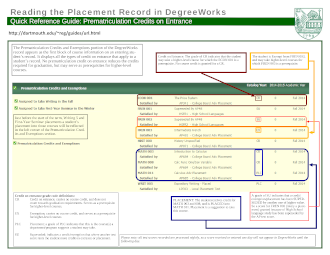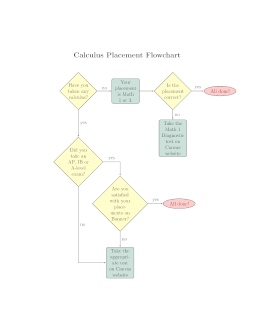Common Questions about placement and placement/credit exams
What placement/credit exams are available to take?
- We offer seven placement/credit exams, each of which may be taken only once. Four of them cover calculus, the material in Math 1, 3, 8, 11 (see the description of Dartmouth's core calculus courses and variants). The other three cover more advanced subjects: linear algebra, differential equations, and number theory.
- The Math 1 exam is really a diagnostic exam to see if you are ready for Math 3. If you have seen any calculus already, you probably should not be in Math 1, but in Math 3 and need not take any placement exams. Anyone (who does not already have credit for Math 3) can enroll in Math 3; no placement exams are required.
- You should take the Math 3 placement/credit exam if you feel you know the material in Math 3 (AB calculus), and want to take a more advanced course. Passing the placement/credit exam for Math 3 gives you credit for Math 3 and placement into Math 8.
- You should take the Math 8 placement/credit exam if you feel you know the material in Math 8 (BC calculus), and want to take a more advanced course. Passing the placement/credit exam for Math 8 gives you credit for Math 8 and placement into Math 9 or 11; see variations on the core calculus track.
- You should take the Multivariable calculus placement/credit exam if you feel you know differential and integral multivariable calculus (the material in Math 11 see variations on the core calculus track), and want to be eligible to take a more advanced course. Passing the placement/credit exam for Multivariable calculus gives you credit for Math 13 and the opportunity to take any math course which has Math 3, 8, or 13 as prerequisite.
- If you have learned material from linear algebra, differential equations or number theory, you should take the appropriate placement/credit exam.
I have taken both AB and BC calculus, but have credit for neither. Which placement exams should I take?
- If your goal is to get credit for Math 3 and 8, you should take the Math 8 exam. Passing it will give you credit for both Math 3 and 8, and placement into Math 9 or 11.
- If you did not pass the Math 8 exam, you are still free to attempt the Math 3 exam to see if you can get credit for Math 3 and placement into Math 8. If you are in this situation, some further review is probably in order.
I have taken a math course at another college or university. How can I get credit for these courses?
- The Math Department does not accept transfer credit from students prior to matriculation, so the only way to obtain credit for work done elsewhere is to take a local placement exam via Canvas.
- For courses for which no placement exam is available, see below.
Where and when should I take a math placement test?
- The placement/credit exams are hosted on Canvas (a Dartmouth web resource), meaning all these exams may be taken online before getting to campus.
- The Canvas placement testing site will open on August 1. You will receive an email over the summer on how to access it.
- Preparation is key since you have only one chance to pass a given placement/credit exam. Do not go to the Canvas site until you ready to take the exam.
- Extensive review and preparation materials including textbook references, video links and practice exams are available on the Core Calculus web page.
- To ensure correct placement before enrolling in Fall term classes, placements exams must be taken at the latest by Wednesday noon, two days prior to enrollment, in the week before the start of Fall term classes.
- If you were unable to take a placement exam in time for Fall term enrollment, you may still take placement exams until the end of Fall term. The due date for mathematics placement exams is November 30. If, at a later date, you choose a major or minor which has a calculus prerequisite, and you did not secure an accurate placement upon matriculation, you may petition the advisor to first-year students, professor Van Erp (fyadvising@math.dartmouth.edu), to re-open the appropriate placement exam for you.
- Placement exams are specifically intended as a means to acknowledge prematriculation credits. They can not be used after Freshmen Fall term as a means to test out of required college courses (through self-study, or by taking online courses, etc.).
How do I determine my official placement in Mathematics?
- All of your official Dartmouth record is kept on DartHub (BannerStudent).
- If you have taken AP, IB, or British-based A-level exams, be sure to have those scores reported to Dartmouth as they impact your mathematics placement. Your student record is updated throughout the summer (and indeed may not be up-to-date until orientation), but you should get familiar with it.
- On DartHub you can examine your placement record, a sample of which is here, and which gives a good overview of your placement. Be sure to go back to the core calculus course page to help you recall the content of our calculus courses.
 [click the image to magnify/shrink]
[click the image to magnify/shrink]
How can I determine if I should take a math placement test, and if so, which one?
- The first question you need to answer is whether you are content with your current math placement, and that may not be completely obvious. Check your current placement by reading the above information block.
- If you are content with your current placement, you do not need to take any placement exam in math. As a first pass, check out the flow chart below to help with the process.
- If you are still reading, you are not entirely content with your current placement. We offer four calculus placement/credit exams described above, and three exams on post calculus material.
- There is often uncertainty about placements between courses at
boundaries: Math 1/3, 3/8, 8/MVC (MVC=Multivariable Calculus), and that is quite
natural. Let's make some general remarks.
- Math 1 versus Math 3: The
general rule is that if you have taken any calculus at all,
you should not enroll in Math 1, but if you are still uncertain,
you should do two things. The first is to review to syllabi
for these courses:
Sample Math 1 syllabus,
and
detailed Math 3 syllabus with video
review links.
Then after reviewing the syllabi, if you are still uncertain, you can take the Math 1 diagnostic test, one of the placement exams on Canvas. If you are comfortable with the material on the Math 1 exam, you should definitely place in Math 3. Please note that you may take each placement test only once, so you should not visit the Canvas page until you are ready to take the test. - Math 3 versus Math 8: Most
people in this situation have credit for Math 3 typically
via an AB placement exam, and have seen significant
material covered in the Math 8 syllabus from BC calculus,
but not acquired Math 8 credit. You are strongly
encouraged to look over
the detailed Math 8 syllabus with video review
links and decide whether — with review —
you could be adequately prepared to pass the Math 8
placement exam on Canvas. The exam will open in early
August and you have until early September to take it in
time for fall registration.
You have absolutely nothing to lose, a great deal to gain, and are safe no matter how things turn out. If you fail, you take Math 8 and you have already done some review — remember only half of Math 8 is BC calculus; the other half starts multivariable calculus.
And if you pass, you have three options which even includes taking Math 8 again anyway. See Variations on the core calculus sequence. Please note that you may take each placement test only once, so you should not visit the Canvas page until you are ready to take the test. - Math 8 versus MVC: If you are at this decision point, you have credit for Math 8 (by whatever means including local placement test), and you have many options. You can choose one of the Math 8/9/11 options detailed in Variations on the core calculus sequence, or if you have seen significant multivariable calculus (see detailed Math 13 syllabus with video review links), you should attempt the MVC placement exam. Please note that you may take each placement test only once, so you should not visit the Canvas page until you are ready to take the test.
- Math 1 versus Math 3: The
general rule is that if you have taken any calculus at all,
you should not enroll in Math 1, but if you are still uncertain,
you should do two things. The first is to review to syllabi
for these courses:
Sample Math 1 syllabus,
and
detailed Math 3 syllabus with video
review links.
 [click the image to magnify/shrink]
[click the image to magnify/shrink]
I have reported AP/IB/A-level credit information to the Registrar's office. Now what?
- Scores received from incoming students are processed by the Registrar throughout the summer and are not guaranteed to entered until early September. You can monitor what has been recorded by checking on BannerStudent, see above.
- On the other hand, you know your scores, and can check your expected placements, referring as needed to the course descriptions.
- If your expected placements are not exactly what you hoped for, revisit your options to take a local placement exam.
I did poorly on my AP exam. Do I have any options?
- You may always take one of our local placement tests to try to better your placement and credit. See the information block above.
I took calculus and/or statistics before coming to Dartmouth, but did not take any AP exams. Can I get credit?
- You can acquire prematriculation credit for math courses only by taking one of our local placement tests. See the information block above.
- In particular, even if you took a math course at another university, you cannot transfer that credit to Dartmouth. The Math Department does not accept transfer credits from students prior to matriculation. You must demonstrate your mastery of the material by taking a local placement test.
Do these placement credits count towards graduation?
- These credits will appear on your transcript (making outside institutions like medical schools happy), but do not count towards distributive requirements, nor do they reduce the number of courses required for graduation.
- They do serve to allow you to take any course for which these are prerequisite.
I took math courses beyond calculus like linear algebra, differential equations, or number theory. What can I do?
- For those who have taken advanced courses for which no placement exam is available, please contact Professor Van Erp and arrangements can be made for an assessment.
- For information (including syllabi) about all courses, see our course information web page.

